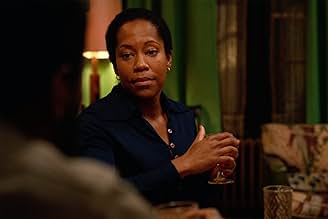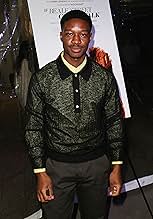AVALIAÇÃO DA IMDb
7,1/10
54 mil
SUA AVALIAÇÃO
Uma mulher do Harlem, grávida de seu primeiro filho, tenta provar a inocência de seu noivo.Uma mulher do Harlem, grávida de seu primeiro filho, tenta provar a inocência de seu noivo.Uma mulher do Harlem, grávida de seu primeiro filho, tenta provar a inocência de seu noivo.
- Ganhou 1 Oscar
- 108 vitórias e 194 indicações no total
Aunjanue Ellis-Taylor
- Mrs. Hunt
- (as Aunjanue Ellis)
- Direção
- Roteiristas
- Elenco e equipe completos
- Produção, bilheteria e muito mais no IMDbPro
Avaliações em destaque
Two years after sending shockwaves through the film world with "Moonlight," which went on to win Best Picture at the Academy Awards, Barry Jenkins is back with "If Beale Street Could Talk." Needless to say, the film is excellent and is everything one could hope a follow-up to "Moonlight" would be. The film follows a young African-American couple in Harlem before and during when the man is wrongfully accused of sexual assault. While such difficult subject matter could feel slightly tone-deaf to some in the era of #MeToo, viewers should rest assured that Jenkins handles the material with a delicate and incredibly thoughtful sense of sensitivity. Like "Moonlight," the film's aesthetic qualities feel almost lyrical in tone, which is a beautiful sight to behold. The score is also superb as well, managing to be both quietly rousing and emotionally stirring.
Jenkins' technique of characterizing the setting or settings where his films are set is put to great use here. New York City feels almost like a character in this film, as it adds a rich tapestry to the film's narrative. This sense is heightened further when paired with a meticulous sound design, where even simple and day-to-day sounds like a subway car rolling into the station enhance the viewing experience. The acting is strong and quietly powerful from beginning to end, and the amount of thoughtful character development that Jenkins deploys throughout the story's narrative is commendable. The same can be said to the film's frequent use of narration. In many other films, this could have come off as annoying, but the film uses this tactic to great ends here by primarily using it to enhance the audience's emotional connection to the characters. Such a connection further builds up the powerful nature of the film's narrative, which makes a powerful and deeply tragic statement on the nature of racism without ever resorting to feeling heavy-handed by the end. I will note that the film does take some time to get going and has a few minor redundancies in its beginning scenes. But otherwise, this film is superb and on par with "Moonlight" in quality. Baldwin's prose is not just honored in this film, but it is cherished. 9/10
Jenkins' technique of characterizing the setting or settings where his films are set is put to great use here. New York City feels almost like a character in this film, as it adds a rich tapestry to the film's narrative. This sense is heightened further when paired with a meticulous sound design, where even simple and day-to-day sounds like a subway car rolling into the station enhance the viewing experience. The acting is strong and quietly powerful from beginning to end, and the amount of thoughtful character development that Jenkins deploys throughout the story's narrative is commendable. The same can be said to the film's frequent use of narration. In many other films, this could have come off as annoying, but the film uses this tactic to great ends here by primarily using it to enhance the audience's emotional connection to the characters. Such a connection further builds up the powerful nature of the film's narrative, which makes a powerful and deeply tragic statement on the nature of racism without ever resorting to feeling heavy-handed by the end. I will note that the film does take some time to get going and has a few minor redundancies in its beginning scenes. But otherwise, this film is superb and on par with "Moonlight" in quality. Baldwin's prose is not just honored in this film, but it is cherished. 9/10
I want to love this film and everything about it except, just about every scene is three times longer than it needs to be.
This film is based on James Baldwin's novel of the same name. I read it at the time and was very moved. It told me so much I didn't know. But that was in 1974, and one has heard the same story over and over since then. Barry Jenkins is telling a period piece, a mood piece. It is brilliantly acted and gorgeously shot. The music is too loud, but maybe that is deliberately appropriate. The narrative moves very slowly, with the deceptive languor of the South. That might work if it were set in the South, but it's not; it's Harlem. It has the feel of 1974, and it certainly could be New York - or Philadelphia or Baltimore - or Chicago or Detroit (which was only beginning to disintegrate then). In short, it doesn't feel tethered. Memphis, it is not. The result is that, unlike Moonlight, which was very involving, this film is rather stereotypical. Again, that was new in 1974. But not now. Today, we see the same stories over and over on TV screens - some of which are sadly still all too true, and others which are probably ginned up and definitely exploitive. I kept looking at my watch and thinking, "will nothing ever happen?", and it didn't. In short, If Beale Street Could Talk does look impressive. (Jenkins' fans are already gushing. And I am one, but I'm not blown away.) Moonlight it is not.
Based on James Baldwin's 1974 novel of the same name, If Beale Street Could Talk is really two stories in one; there's the love story at the narrative's core, giving the film much of its tonal qualities, and on the surface, there's a socio-political protest, which provides most of the main plot points. At a quick glance, this should be a masterpiece - there's the foundation of James Baldwin, arguably the most significant African-American author of all time, and this is the first English-language adaptation of one of his novels; there's writer/director Barry Jenkins, fresh off the Oscar-winning Moonlight: Sob a Luz do Luar (2016); there's a theme that is (sadly) almost as pertinent now as it was in 1974; there's James Laxton's extraordinarily vibrant cinematography; there's a bevvy of hugely talented actors; there's Nicholas Britell's absorbing and melancholy score. This should have been a home run. However, although I found it aesthetically faultless, much like Moonlight, I felt the totality was considerably less than the sum of its exceptional parts. The biggest problem is the somnolent love story. Employing a Terrence Malick-esque esoteric voiceover, Jenkins lifts entire passages directly from Baldwin. However, what reads beautifully in the novel is badly out of place in the film, even in voiceover, and has the effect of rendering the two central characters completely unrealistic, with their love for one another idealised to such an extent as to become ridiculous.
New York, 1974; 19-year old Clementine "Tish" Rivers (KiKi Layne) and 22-year old Alonzo "Fonny" Hunt (Stephan James), who have known one another since they were children, have fallen in love, and are planning to get married and raise a family. Fonny has quit his job working for a furniture manufacturer, hoping instead to make it as a sculptor. However, when he is accused of rape, the victim mistakenly identifies him in a line-up, and he is charged and detained. Awaiting his trial, Tish visits him in jail, telling him she is pregnant. Ecstatic at the news, Fonny says he can't be in prison when the baby is born, and so Tish and her family determine to do anything it takes to get him out as soon as possible. With this as the central framework, the story is told in a non-linear style, jumping back and forth from one time period to another, which has an important thematic effect that I'll discuss below.
Aesthetically, much like Moonlight, If Beale Street Could Talk looks amazing. From Laxton's vibrant cinematography to Caroline Eselin's colour coordinated costume design (just look at all the yellow in the opening scene - in both the photography and the wardrobe), everything we see rings true, like a Jack Garofalo photograph come to life. Even more visually lyrical than Moonlight, the saturated colour palette of Beale Street recalls Douglas Sirk's Technicolour-soaked melodramas. Jenkins has been very open about his admiration for filmmakers such as Sirk, Claire Denis, and Hsiao-Hsien Hou. However, he is most clearly indebted to Wong Kar-Wai; seen in Beale Street's non-linear narrative and relatively slight plot, its poetic tone, the centrality of music, and its tendency to use visuals rather than dialogue to convey thematic points (although Jenkins is nowhere near as formally experimental as Wong).
As in both Remédio Para Melancolia (2008) and Moonlight, Jenkins occasionally has characters speak directly to camera. They're not breaking the fourth wall, however. Such scenes are dialogue scenes, with two characters speaking to one another, so when one speaks directly to camera, it's as if the camera is between the two of them. It's a technique that was used most famously (and effectively) in O Silêncio dos Inocentes (1991), where each character looked directly into camera when speaking to Clarisse Starling (Jodie Foster), whereas she always looked just slightly off-camera, setting up a fascinating visual contrast which encourages us to identify with her. Beale Street doesn't do anything as interesting or subtle with the technique, but Jenkins's tendency to use it during moments of heightened emotion does have the effect of suturing the audience into the milieu of the film.
As mentioned above, the use of a non-linear narrative structure has an important thematic effect. We know from the second scene that Fonny is in jail, meaning that as we watch Tish and Fonny planning their future, renting an apartment, having sex for the first time etc, there's a permanent shadow over everything we see; we know that things go wrong, because we know much more than the characters do. For the most part, this contributes to the tone of the film, thus justifying itself. However, Jenkins overuses the technique. I understand why the film is told out of sequence, but I don't understand why it's told out of sequence to such an extent. Compare this with Sean Penn's A Promessa (2001). For the most part, it's a linear narrative, except that the first scene shows us the protagonist, Jerry Black (Jack Nicholson) as a broken-down alcoholic. The rest of the film takes place prior to this scene, so when we see Nicholson fall in love with Lori (Robin Wright) and spend a blissful Christmas with her and her daughter, we know that something terrible is coming, knowledge that casts a shadow over the entire film. Penn accomplishes this with a single scene, right at the start of the film. Beale Street, on the other hand, jumps all over the place, never settling into a standardised rhythm, with the cumulative effect becoming one of distraction rather than immersion.
Which brings me to the film's most significant problem - the love story at its centre just didn't work for me. This is partly because of the emotional distance Jenkins maintains, but it's primarily because Fonny and Tish don't seem like real people, not in the way they gaze into one another's eyes as if they are seeing each other for the first time, not in the way they speak to one another as if every syllable is of earth-shattering portentousness. They rarely speak normally; instead, they adopt the eloquence of James Baldwin. In lifting sections directly from the novel, Jenkins has failed to consider the differing demands of the medium - what works on the page, doesn't necessarily work on the screen, and the reproduction of Baldwin's rich and lugubrious prose is simply unrealistic, with the delivery sounding stilted and awkward, and, most egregiously, far beyond the lexicon of the characters. This is especially apparent in Tish, whose expressive voiceover is far beyond anything we see of her character in the film itself.
In this sense, they don't come across as people with their own interiority and psychological verisimilitude, instead functioning as cogs in the machinations of Jenkins's thematic concerns. Tish, in particular, feels like a cypher, because of her dual role as a young girl trying to get her man out of jail, and a sage-like observer of institutionalised racism. Fonny too has an important dual role - that of a young man falsely imprisoned, and that of a tragic figure standing in for the millions of African-Americans unjustly imprisoned throughout history. Jenkins doubles down on this point by intercutting the film with black-and-white photographs of Henry Smith, Jesse Washington, Will Brown, Emmett Till, and the Freedom Summer Murders. The point is clear; Fonny is a grand representative of the crimes committed against Africa-Americans in the US. However, his character never attains the kind of grandeur such a representative must, by definition, possess.
Another problem concerns the depiction of Bell (Ed Skrein), the racist cop who frames Fonny. Played as a leering pantomime villain, with bad hair, bad teeth, and bad skin, he's obviously a metaphor for the ugliness of racism, but he's so completely over the top, it rips you right out of the film. On the other hand, Regina King's portrayal of Tish's mother, Sharon, is exceptional. If you really want to see what an acting powerhouse King can be, she's never been better than she was in the second season of The Leftovers (2014), and she brings much of the silent depth with which she portrayed Erika Murphy in that show to Beale Street. The scene where she heads to Puerto Rico to try to persuade the rape victim, Victoria Rogers (Emily Rios), that Fonny didn't rape her is one of the most harrowing things you'll see on screen all year, with King conveying her emotional state primarily by her facial gestures.
Beale Street is an undeniably beautiful film that depicts the love between two astonishingly attractive people (it's worth noting that in the novel, Fonny's unattractiveness is emphasised). Jenkins's interpretation turns Fonny and Tish into a Ken and Barbie-esque couple, undermining Baldwin's depiction of them as existing in a realistic milieu. Taking a meditative approach to the material, Jenkins's adaptation never rings true. Whereas Baldwin's Tish and Fonny are flawed, contradictory, and relatable, Jenkins's protagonists are too-perfect-to-be-real, with every agonisingly serious pronouncement they make to one another pushing them further and further away from connecting with the audience on an emotional level.
New York, 1974; 19-year old Clementine "Tish" Rivers (KiKi Layne) and 22-year old Alonzo "Fonny" Hunt (Stephan James), who have known one another since they were children, have fallen in love, and are planning to get married and raise a family. Fonny has quit his job working for a furniture manufacturer, hoping instead to make it as a sculptor. However, when he is accused of rape, the victim mistakenly identifies him in a line-up, and he is charged and detained. Awaiting his trial, Tish visits him in jail, telling him she is pregnant. Ecstatic at the news, Fonny says he can't be in prison when the baby is born, and so Tish and her family determine to do anything it takes to get him out as soon as possible. With this as the central framework, the story is told in a non-linear style, jumping back and forth from one time period to another, which has an important thematic effect that I'll discuss below.
Aesthetically, much like Moonlight, If Beale Street Could Talk looks amazing. From Laxton's vibrant cinematography to Caroline Eselin's colour coordinated costume design (just look at all the yellow in the opening scene - in both the photography and the wardrobe), everything we see rings true, like a Jack Garofalo photograph come to life. Even more visually lyrical than Moonlight, the saturated colour palette of Beale Street recalls Douglas Sirk's Technicolour-soaked melodramas. Jenkins has been very open about his admiration for filmmakers such as Sirk, Claire Denis, and Hsiao-Hsien Hou. However, he is most clearly indebted to Wong Kar-Wai; seen in Beale Street's non-linear narrative and relatively slight plot, its poetic tone, the centrality of music, and its tendency to use visuals rather than dialogue to convey thematic points (although Jenkins is nowhere near as formally experimental as Wong).
As in both Remédio Para Melancolia (2008) and Moonlight, Jenkins occasionally has characters speak directly to camera. They're not breaking the fourth wall, however. Such scenes are dialogue scenes, with two characters speaking to one another, so when one speaks directly to camera, it's as if the camera is between the two of them. It's a technique that was used most famously (and effectively) in O Silêncio dos Inocentes (1991), where each character looked directly into camera when speaking to Clarisse Starling (Jodie Foster), whereas she always looked just slightly off-camera, setting up a fascinating visual contrast which encourages us to identify with her. Beale Street doesn't do anything as interesting or subtle with the technique, but Jenkins's tendency to use it during moments of heightened emotion does have the effect of suturing the audience into the milieu of the film.
As mentioned above, the use of a non-linear narrative structure has an important thematic effect. We know from the second scene that Fonny is in jail, meaning that as we watch Tish and Fonny planning their future, renting an apartment, having sex for the first time etc, there's a permanent shadow over everything we see; we know that things go wrong, because we know much more than the characters do. For the most part, this contributes to the tone of the film, thus justifying itself. However, Jenkins overuses the technique. I understand why the film is told out of sequence, but I don't understand why it's told out of sequence to such an extent. Compare this with Sean Penn's A Promessa (2001). For the most part, it's a linear narrative, except that the first scene shows us the protagonist, Jerry Black (Jack Nicholson) as a broken-down alcoholic. The rest of the film takes place prior to this scene, so when we see Nicholson fall in love with Lori (Robin Wright) and spend a blissful Christmas with her and her daughter, we know that something terrible is coming, knowledge that casts a shadow over the entire film. Penn accomplishes this with a single scene, right at the start of the film. Beale Street, on the other hand, jumps all over the place, never settling into a standardised rhythm, with the cumulative effect becoming one of distraction rather than immersion.
Which brings me to the film's most significant problem - the love story at its centre just didn't work for me. This is partly because of the emotional distance Jenkins maintains, but it's primarily because Fonny and Tish don't seem like real people, not in the way they gaze into one another's eyes as if they are seeing each other for the first time, not in the way they speak to one another as if every syllable is of earth-shattering portentousness. They rarely speak normally; instead, they adopt the eloquence of James Baldwin. In lifting sections directly from the novel, Jenkins has failed to consider the differing demands of the medium - what works on the page, doesn't necessarily work on the screen, and the reproduction of Baldwin's rich and lugubrious prose is simply unrealistic, with the delivery sounding stilted and awkward, and, most egregiously, far beyond the lexicon of the characters. This is especially apparent in Tish, whose expressive voiceover is far beyond anything we see of her character in the film itself.
In this sense, they don't come across as people with their own interiority and psychological verisimilitude, instead functioning as cogs in the machinations of Jenkins's thematic concerns. Tish, in particular, feels like a cypher, because of her dual role as a young girl trying to get her man out of jail, and a sage-like observer of institutionalised racism. Fonny too has an important dual role - that of a young man falsely imprisoned, and that of a tragic figure standing in for the millions of African-Americans unjustly imprisoned throughout history. Jenkins doubles down on this point by intercutting the film with black-and-white photographs of Henry Smith, Jesse Washington, Will Brown, Emmett Till, and the Freedom Summer Murders. The point is clear; Fonny is a grand representative of the crimes committed against Africa-Americans in the US. However, his character never attains the kind of grandeur such a representative must, by definition, possess.
Another problem concerns the depiction of Bell (Ed Skrein), the racist cop who frames Fonny. Played as a leering pantomime villain, with bad hair, bad teeth, and bad skin, he's obviously a metaphor for the ugliness of racism, but he's so completely over the top, it rips you right out of the film. On the other hand, Regina King's portrayal of Tish's mother, Sharon, is exceptional. If you really want to see what an acting powerhouse King can be, she's never been better than she was in the second season of The Leftovers (2014), and she brings much of the silent depth with which she portrayed Erika Murphy in that show to Beale Street. The scene where she heads to Puerto Rico to try to persuade the rape victim, Victoria Rogers (Emily Rios), that Fonny didn't rape her is one of the most harrowing things you'll see on screen all year, with King conveying her emotional state primarily by her facial gestures.
Beale Street is an undeniably beautiful film that depicts the love between two astonishingly attractive people (it's worth noting that in the novel, Fonny's unattractiveness is emphasised). Jenkins's interpretation turns Fonny and Tish into a Ken and Barbie-esque couple, undermining Baldwin's depiction of them as existing in a realistic milieu. Taking a meditative approach to the material, Jenkins's adaptation never rings true. Whereas Baldwin's Tish and Fonny are flawed, contradictory, and relatable, Jenkins's protagonists are too-perfect-to-be-real, with every agonisingly serious pronouncement they make to one another pushing them further and further away from connecting with the audience on an emotional level.
If Beale Street Could Talk's screenplay lacks enough genuine conflict to keep it as engaging as it could be.
Você sabia?
- CuriosidadesThe name Deux Soeurs is displayed at the perfume counter where Tish works. Deux Soeurs is not a known parfumerie, but Deux Soeurs, LLC is credited as the film's copyright holder. The story also features two pairs of sisters.
- Erros de gravaçãoWhen Tish is waiting on a subway platform where the 1960s-style enamel column plates say that the station is 135th St (probably on the 8th Ave line rather than on the Lenox Ave line). However, the mosaic on the wall above the tracks features a capital 'B' -- suggesting that filming may have taken place in the now-closed-off part of the Bowery station on the Nassau St line.
- Citações
Sharon Rivers: I don't want to sound foolish, but remember love is what brought you here. And if you've trusted love this far, don't panic now. Trust it all the way.
- ConexõesFeatured in WatchMojo: Top 10 Early Oscar Contenders You NEED to See (2018)
- Trilhas sonorasMist of a Dream
Written by Sidney Banks
Performed by Birdlegs & Pauline
Courtesy of The Numero Group
By arrangement with Bank Robber Music
Principais escolhas
Faça login para avaliar e ver a lista de recomendações personalizadas
- How long is If Beale Street Could Talk?Fornecido pela Alexa
Detalhes
- Data de lançamento
- País de origem
- Centrais de atendimento oficiais
- Idiomas
- Também conhecido como
- Si la colonia hablara
- Locações de filme
- Empresas de produção
- Consulte mais créditos da empresa na IMDbPro
Bilheteria
- Orçamento
- US$ 12.000.000 (estimativa)
- Faturamento bruto nos EUA e Canadá
- US$ 14.915.773
- Fim de semana de estreia nos EUA e Canadá
- US$ 224.476
- 16 de dez. de 2018
- Faturamento bruto mundial
- US$ 20.596.567
- Tempo de duração1 hora 59 minutos
- Cor
- Mixagem de som
- Proporção
- 2.00 : 1
Contribua para esta página
Sugerir uma alteração ou adicionar conteúdo ausente

Principal brecha
What is the streaming release date of Se a Rua Beale Falasse (2018) in Canada?
Responda









































